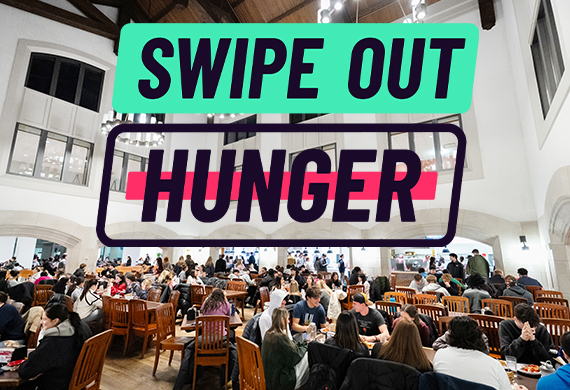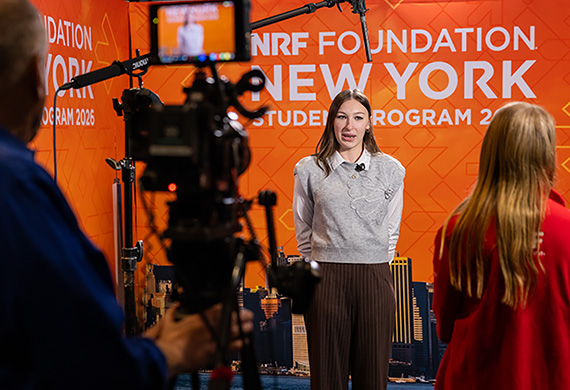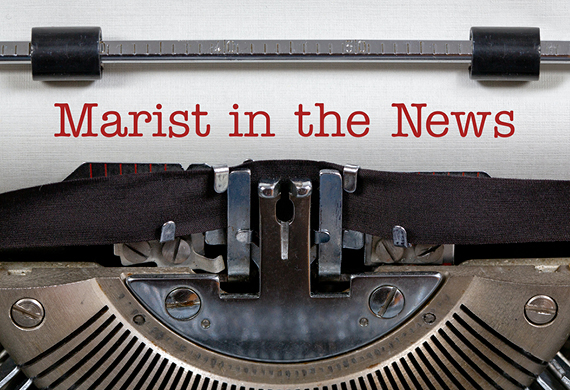Lenni Joya ‘19 Earns Prestigious Payne Fellowship at the United States Agency for International Development
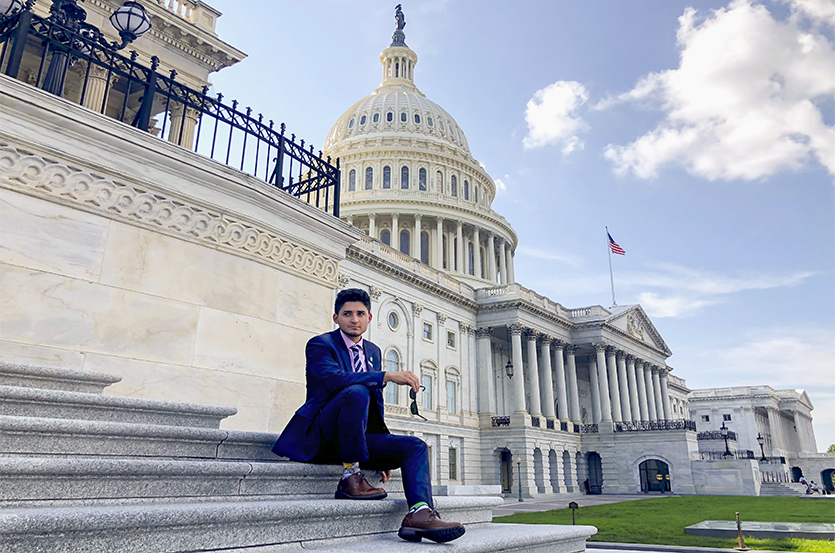
Joya makes Marist history as the College’s first-ever Payne Fellow.
March 4, 2021—Lenni Joya '19 has been awarded the prestigious USAID Donald M. Payne International Development Graduate Fellowship. Joya was one of 15 recipients this year out of a total pool of 649 applicants.
This achievement is singular, but all the more remarkable given Joya’s path in the U.S. and at Marist. He came to the United States as an undocumented minor from El Salvador in 2011; he was also a first-generation college student. Those life experiences provided a perspective that made him uniquely qualified to be a Payne Fellow.
Administered by the U.S. Agency for International Development, the Payne Fellowship Program has fellows earning a master's degree in international development while participating in two USAID internships, ultimately serving five years abroad as part of the Foreign Service. "My dream job was to work abroad in many countries and work in fields of development. I always wanted to work with people in developing nations and wanted to do work for marginalized groups in different countries through the Department of State," said Joya.
Life Outside His Comfort Zone
Throughout Joya's life in the U.S. and at Marist, he has had to make his own opportunities and ensure that he was doing everything he could to reach his dreams. From finding out how to attend college where he could support himself to carving out his own abroad experience in Argentina and Italy to applying to competitive fellowships, Joya has been a strong advocate for himself since day one.
"As a first-generation college student, it's difficult because your parents don’t know anything about college. My parents, you know, they weren't even able to support me fully with my college expenses or application process. It was everything on me, applications, money, going to the interview, and all that. I was all on my own in terms of carving my own path to college. So it was very difficult at the moment, especially the beginning," said Joya.
From an early age, Joya was used to being in uncomfortable situations where he had to grow. "I always say I'm an outlier. I am used to going to those uncomfortable areas," said Joya. As an undocumented minor, coming to the U.S. presented some hurdles and Joya had to make the difficult transition to find opportunity.
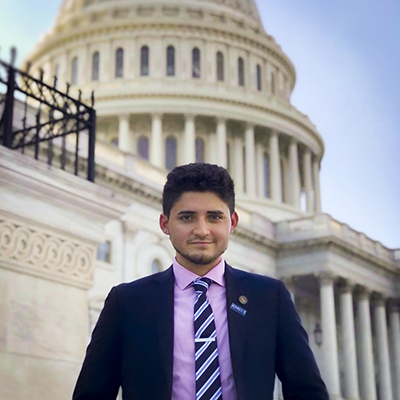
Adjusting to a new culture and family, meeting his mother for the first time after fourteen years, Joya also had to learn English once he moved to Huntington, Long Island. By his senior year of high school, Joya hadn't considered attending college. After repeatedly being told that college wasn't for him and the goal of higher education wasn't in his grasp, he was motivated to prove everyone wrong. "It kind of pushed me to go beyond what I can do," said Joya.
This is where the Arthur O. Eve Higher Education Opportunity Program (HEOP) came in and provided Joya the resources, both financial and academic, to reach his dream of attending college. At Marist, Joya was an ambitious student with a double major in Political Science and Spanish, a concentration in Bilingual Education, and triple minors (in Latin American and Caribbean Studies, Global Studies, and Italian). He was also in and out of Graduate School and Fellowship Advisor Pat Taylor's office, trying to find a way to get the most out of his time at Marist and set himself up for success after graduation.
"I am so proud of him. He's had the most remarkable determination throughout his time at Marist," said Taylor. "Within weeks, after my presentation to the HEOP group, Lenni was in my office picking my brain about everything."
Path to the Payne Fellowship
Joya spent one semester studying abroad in Argentina and one summer volunteering in Italy. While in Argentina, he was able to work through the UN High Commissioner for Refugees to help marginalized people, LGBTQ+ communities, immigrants, and more. Doing work as he did in Argentina was a stepping stone to realize he wanted to help people in marginalized communities worldwide.
After spending a summer in Italy teaching English, Joya knew that's what he wanted to do, so he applied to the prestigious Fulbright program. "I came back and I decided to apply for the Fulbright to go back to Italy and teach English, so I applied to it and I got in last year," Joya said. However, due to COVID-19, the start date kept being pushed further and further back until he had to choose between the Payne Fellowship or the Fulbright program.
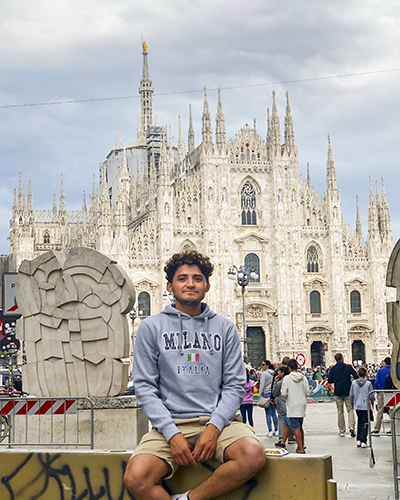
Taylor assisted Joya in all of his applications to fellowships, jokingly calling him one of her office's “frequent fliers.” She also worked with him on his Payne application. In comparing the Payne Fellowship with the Fulbright program, Taylor differentiates one key aspect. "It's absolutely a career maker," said Taylor.
After being the first Marist student ever called to interview for the Payne Fellowship, Joya had to decide whether or not to pursue it. The Payne Fellowship does not allow deferrals; if he were accepted, he must take part or wait to be sent to Italy as a Fulbright student grant recipient.
The Payne Fellowship is an opportunity that is a perfect fit for Joya. "I come from a developing nation, El Salvador, and I know the difficulties of living in a developing country. I understand the challenges of going to school without any food to eat or the lack of appropriate equipment or infrastructure in school. Where I come from is a sign of why I was so equipped to work with the USAID, because of the work they do. In the program, you're representing the U.S., but you also have your own knowledge and experience you can implement in the field."
"This summer, I'm going to Washington, DC for my first internship as a part of the Payne Fellowship in Capitol Hill,” said Joya. “After we finish our first year of graduate school, we get to choose our top 10 countries we want to go to, and they will send you for an internship abroad for a summer in one of those countries that has a USAID mission."
Joya has always had a passion for teaching and, through the Payne Fellowship, he will be able to focus on education. "I was very clear in explaining that I want to work in the education field. And I want to work with children, you know, with school programs, trying to make sure that more children go to school and work with governments to support more students to go to college, and develop their education systems in which if they do that, they will have more advantage and more development," said Joya.
Taylor agrees. "One of the reasons why Lenni is such a phenomenal fit for this is, he's been there. He comes from El Salvador, he knows about the reality on the ground," said Taylor. "He can identify with the people that he's interacting within other countries. He knows where they're coming from. And for that reason, he was just a stand-out candidate."
After his summer internship Joya will begin his international development graduate studies in fall 2021. Currently, Joya has been accepted to Edmund A. Walsh School of Foreign Service at Georgetown University, George Washington University and the School of Advanced International Studies at Johns Hopkins University. He is still awaiting decisions from the School of International and Public Affairs at Columbia University, and the Kennedy School at Harvard University. All of these programs and schools are fully funding Joya’s two-year master’s degree beyond what is covered by the Payne award.

